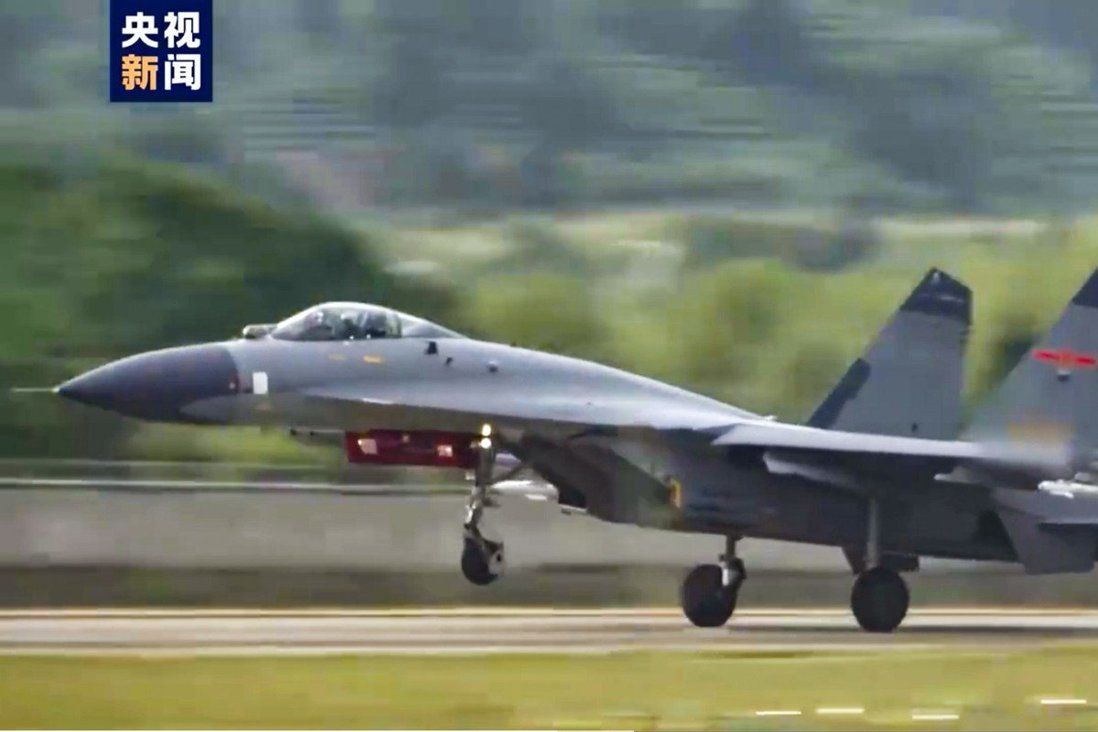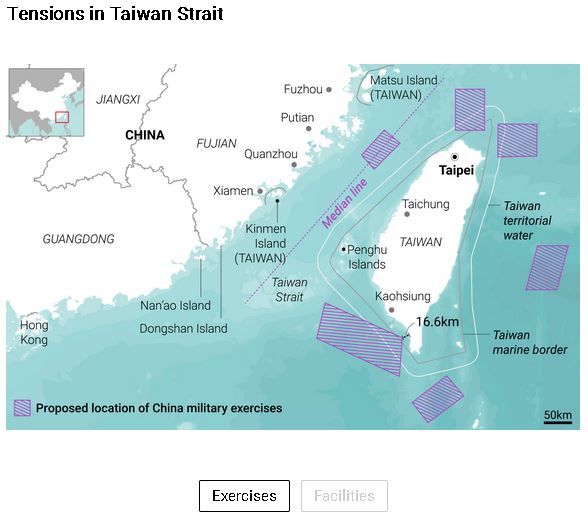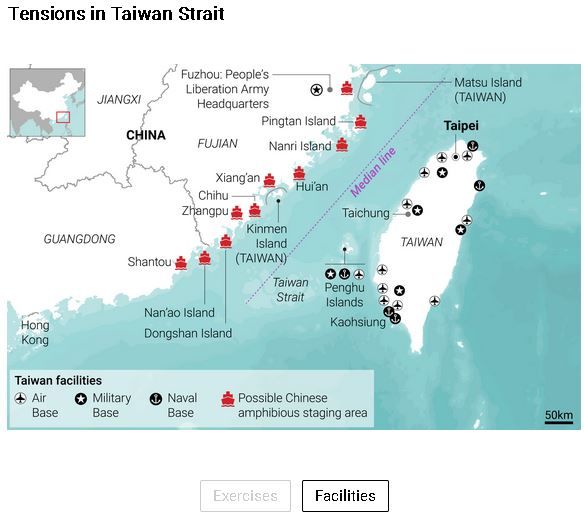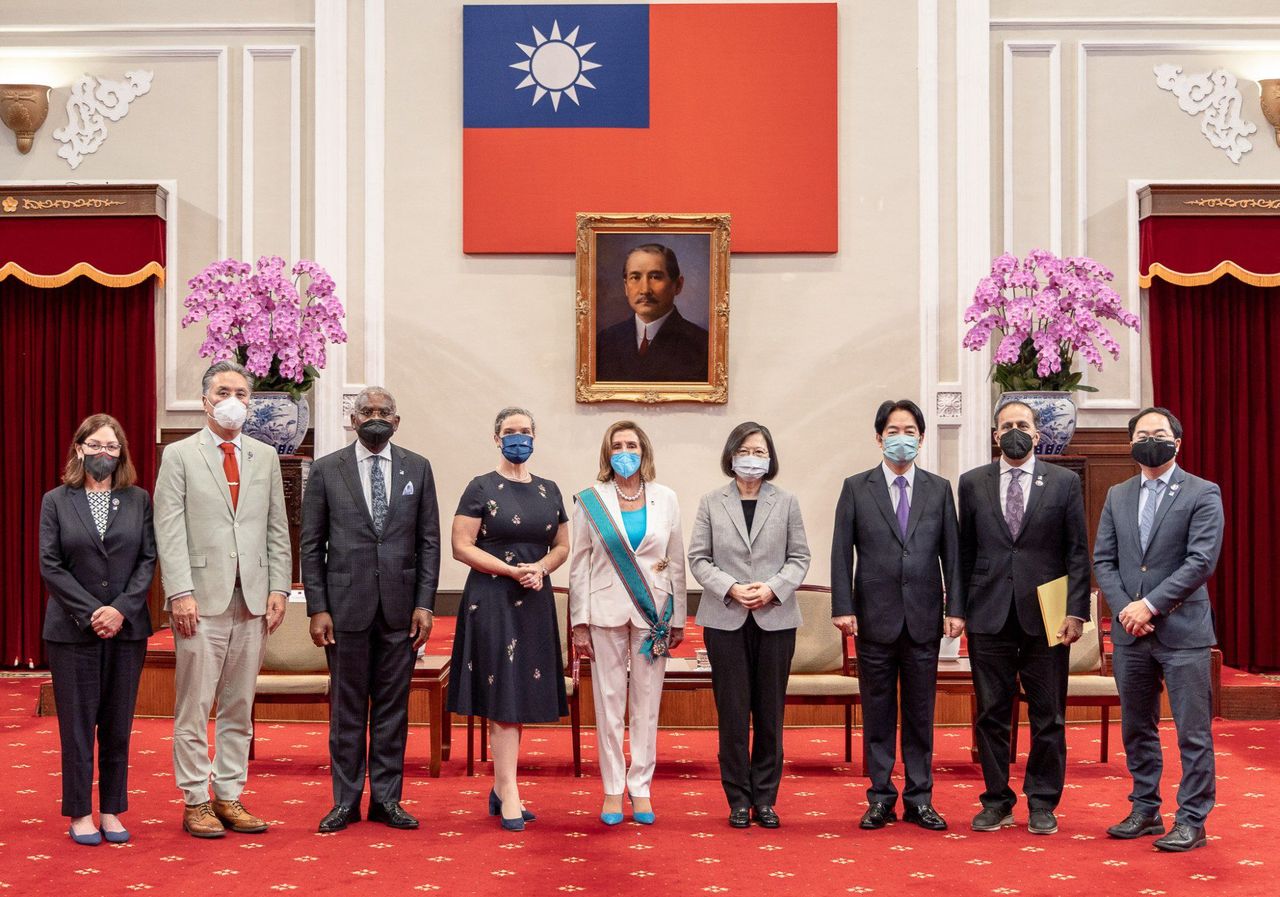Unprecedented live-fire drills encircling the island will block flights and shipping as analysts predict further punitive measures.
China is set to launch an unprecedented military drill that effectively blockades Taiwan until Sunday afternoon following US House Speaker Nancy Pelosi’s visit to the island.
During her brief stay Pelosi met President Tsai Ing-wen and other senior politicians as well as human rights activists, before flying on to South Korea on Wednesday afternoon.
 The PLA Eastern Theater Command stages joint training exercises on Wednesday morning.
The PLA Eastern Theater Command stages joint training exercises on Wednesday morning.
Her visit to the island, which Beijing regards as a breakaway province, has plunged the China-US relationship to new depths and triggered the worst crisis over the Taiwan Strait for decades.
Beijing saw the trip as an explicit provocation and a move to embolden the island’s independence-leaning government.


Chinese Foreign Minister Wang Yi lashed out at the visit, saying it “maliciously violated China’s sovereignty” and proved that the US was the “biggest destroyer of peace and regional stability in the Taiwan Strait”.
Beijing followed the condemnation with a slew of punitive measures against Taiwan, including live-drills in six areas around the island’s coastline that will run between noon on Thursday and the same time on Sunday.
Airlines operating in Asia were warned to avoid flying close to Taiwan during the exercise with ships being told to stay away from the “danger zones”.
Pelosi, second in the line of succession to the presidency, is the highest-level American politician to visit Taiwan in 25 years, defying repeated protests from China.
During her stay in Taiwan, she held talks with Taiwanese President Tsai Ing-wen, legislature deputy speaker Tsai Chi-chang, vice-president William Lai and other senior officials.
She also met a former student leader from the 1989 Tiananmen protests, a Hong Kong bookseller who fled to Taiwan after allegedly being kidnapped by mainland agents and a Taiwanese activist who was recently released from a mainland prison.
During the meeting with Tsai, Pelosi said her visit – on which she was accompanied by five members of Congress – was to show “American solidarity to Taiwan” and make it “unequivocally clear we will not abandon our commitment to Taiwan”.
“America’s determination to preserve democracy, here in Taiwan and around the world, remains ironclad,” she said.
Tsai presented Pelosi with a civilian honour, the Order of the Propitious Clouds, and vowed that Taiwan would not back down in the face of military threats from the mainland.
“Military exercises are unnecessary responses. Taiwan has always been open to constructive dialogue, and we will work with stakeholders to bring about stability and peace in the region,” Tsai said.
“We will firmly uphold our sovereignty and continue to hold the line of defence for democracy.”
Addressing the media, Pelosi said Beijing could not stand in the way of visits by other members of the US legislature. She was non-committal about inviting Tsai to Capitol Hill but said “I would hope that opportunity will be there”.
In response to the visit, the Chinese foreign ministry summoned US Ambassador Nicholas Burns late on Tuesday, while Ma Xiaoguang, the spokesman for the State Council’s Taiwan Affairs Office, lashed out at Tsai and her ruling Democratic Progressive Party, saying they were “pushing the island into the abyss of disaster”.
He vowed that China would bring those pushing for Taiwan independence to justice.
According to Taiwan’s defence ministry, the People’s Liberation Army sent 27 planes close to Taiwan on Wednesday, with 22 crossing the median line of the Taiwan Strait and five entering the southern part of the island’s air identification zone. These flight paths include two of the areas where the live-fire drills will take place.
Beijing is expected to unleash more punitive measures in the coming days, with military analysts predicting that the PLA will conduct more regular operations within 12 nautical miles (22.2km) of Taiwan’s coast – an area it views as its territorial waters.
While China has regularly conducted military drills near Taiwan, it has never tried to encircle the island and effect a de facto blockade.
On Wednesday, China’s Ministry of Commerce also suspended natural sand exports to Taiwan, while the General Administration of Customs banned imports of citrus fruits, chilled white scallops and frozen mackerel from the island.
These economic measures are mainly symbolic and account for a tiny fraction of cross-strait trade, but analysts warned that Beijing could escalate economic sanctions against Taiwan, potentially affecting hundreds of billions of dollars worth of investment.
However they also pointed out that such punitive measures would hurt both sides.
“If you’re doing something like this, then it’s more symbolic and not impactful, and now [mainland officials] are looking at how they can move from those symbolic trade barriers to something more impactful,” said Zennon Kapron, Singapore-based director of financial industry research firm Kapronasia.
 S House Speaker Nancy Pelosi and Taiwan’s President Tsai Ing-wen, pictured at the presidential palace in Taipei.
S House Speaker Nancy Pelosi and Taiwan’s President Tsai Ing-wen, pictured at the presidential palace in Taipei.
Observers believe neither Beijing nor Washington will emerge as a winner from Pelosi’s brief trip, which did little to change the balance of power across the strait yet significantly reduced the trust between the world’s two superpowers.
“It will greatly reduce the room for any possible cooperation between China and the US that matters to the wider world, such as on the Ukraine crisis,” said Zhu Feng, an international affairs specialist at Nanjing University.
“Their rather limited bilateral cooperation will be further postponed.”
“[Pelosi] wants to secure her legacy as a long-time China critic and a democracy fighter. Ignoring misgivings by the Biden administration, she tried to turn Taiwan into a second Ukraine.”
He said despite its tough rhetoric, Beijing was “restrained and rational” in its response and had avoided being baited into harsh action.
Paul van der Putten, a senior research fellow and coordinator of the China centre at the Clingendael Institute, a Dutch think tank, said the Pelosi visit had benefited China to some extent as it signals to allies of the US that its behaviour is unpredictable.
“Moreover, the visit also shows that the US does not involve its allies in its decision-making on Taiwan, even though it counts on their support in case of a US-China crisis over Taiwan. This weakens the Biden administration’s attempts at building a broad international coalition to address China’s emergence as a geopolitical rival,” he said.
Li Da-jung, a professor of international relations and strategic studies at Tamkang University in New Taipei, said that a visit by a heavyweight like Pelosi would raise Taiwan’s international profile and strengthen its ties with the US, it also increased its security risks.
“Taiwan is the one to suffer from the fallout of her visit,” he said.















